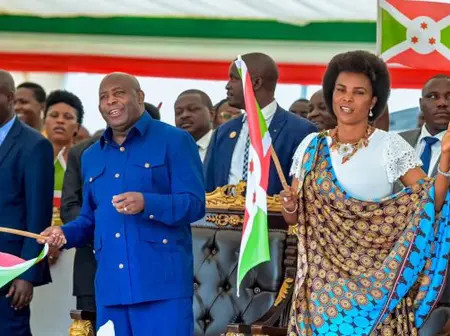The Republic of Burundi is a country in the African Great Lakes region of East Africa. The country is bordered by Tanzania to the east and south, Rwanda to the north, and the Democratic Republic of the Congo (DRC) to the west. Burundi is located in the Albertine Rift and is situated on a rolling plateau in the heart of Africa. The source of the Nile River is located in Burundi’s Bururi Province.
Burundi’s Constitution provides for a 30 percent quota of women in the Government, National Assembly, and Senate, with the objective of ensuring the active participation and role of women in politics.
At the same time, the country has made progress in the representation of women in electoral decision-making positions since 2010, despite the fact that the country has faced socio-economic crises and poor governance throughout its history.
In 2025, Burundi has made significant efforts to promote women’s education, women’s rights, and gender equality to achieve the Sustainable Development Goals (SDGs).
Free schooling for basic education has provided equal opportunities for boys and girls, promoting literacy rates. The country has made significant contributions to implement the Beijing Platform for Action to address the issues, including gender based violence and women’s active participation in the decision-making.
Nevertheless, in 2025, Burundi’s education system faces various challenges, including financial instability in educational institutions, low quality, and gender disparities.
It requires immediate funding for educational institutions to play a more active role in promoting women’s education. The United Nations (UN) and other international organizations have focused on women’s education, with a particular attention to learning poverty.
According to a 2024 UNESCO report, Burundi, like many other African countries, was facing a learning crisis.
Authorities should prioritize addressing learning poverty and improving the quality of education. In Burundi, education opportunities for women are improving, but challenges still persist.
The government has made remarkable steps to address the challenges for women’s education and gender disparities in education. Initiatives have been taken to ensure the representation of girls in schools.
Burundi organized the first national forum to promote girls’ and women’s education in 2024, according to UNESCO. This successful forum for girls’ and women’s education took place in Bujumbura from 3 to 5 December 2024, with a particular focus on “Promoting girls’ and women’s education: a strategy to ensure equitable and inclusive access throughout life”.
Challenges:
Women in Burundi face significant challenges to their empowerment in all spheres, including social, economic, and political. The provision of equal opportunities and resources for women, particularly in rural areas, needs to be enhanced.
The dropout rate of girls in schools needs urgent attention. Causes of the rising dropout rate among girls in schools should be addressed.
Additionally, parental counselling is important for the girls’ education. Parents need to be well aware of the need and importance of girls’ education.

Leave a Reply